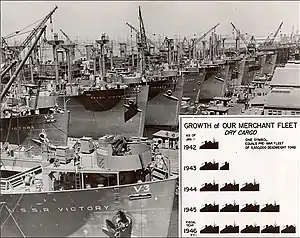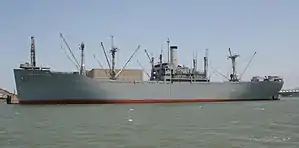 Second ship, with V-5 on the hull, is the SS Philippines Victory, the fifth Victory ship. | |
| History | |
|---|---|
| United States | |
| Name | Philippines Victory |
| Namesake | Philippines |
| Owner | War Shipping Administration |
| Operator | Alcoa Steamship Company |
| Port of registry | |
| Builder | California Shipbuilding Company, Los Angeles |
| Laid down | January 17, 1944 |
| Launched | March 11, 1944 |
| Completed | May 9, 1944 |
| Fate | Sold April 23, 1947, to Belgium |
| Belgium | |
| Name | Mahenge |
| Namesake | Mahenge offensive |
| Owner | Cie. Maritime Congolaise |
| Operator | Cie. Maritime Congolaise |
| Port of registry | |
| Fate | Sank after collision with SS Granville in the English Channel on June 30, 1952 |
| General characteristics | |
| Class and type | VC2-S-AP3 Victory ship |
| Tonnage | 7612 GRT, 4,553 NRT |
| Displacement | 15,200 tons |
| Length | 455 ft (139 m) |
| Beam | 62 ft (19 m) |
| Draught | 28 ft (8.5 m) |
| Installed power | 8,500 shp (6,300 kW) |
| Propulsion | HP & LP turbines geared to a single 20.5-foot (6.2 m) propeller, by Westinghouse Electric & Mfg. Co., Essington |
| Speed | 16.5 knots |
| Boats & landing craft carried | 4 Lifeboats |
| Complement | 62 Merchant Marine and 28 US Naval Armed Guards |
| Armament |
|
| Notes | [1] |
The SS Philippines Victory was the fifth Victory ship built during World War II. She was launched by the California Shipbuilding Company on March 11, 1944, and completed on May 9, 1944. She was built in 113 days under the Emergency Shipbuilding program.
Philippines Victory was one of the new 10,500-ton class ship to be known as Victory ships designed to replace the earlier Liberty Ships. Liberty ships were designed to be used just for World War II. Victory ships were designed to last longer and serve the US Navy after the war. The Victory ship differed from a Liberty ship in that they were: faster, longer and wider, taller, had a thinner stack set farther toward the superstructure and had a long raised forecastle.[2]
Philippines Victory served in the Pacific Ocean during World War II.
Construction
The ship's United States Maritime Commission designation was VC2-S-AP3, hull number 5 (V-5).
On March 11, 1944 Philippines Victory was christened by Mrs. Carmen Sonano, wife of Andres Soriano, Secretary of Finance to President Manuel Roxas of the Philippines and launched at Wilmington, Los Angeles.[3][4][5] The ship was completed and delivered to the wartime operator of all United States oceangoing shipping, the War Shipping Administration (WSA), on May 9, 1944. Philippines Victory was assigned to Alcoa Steamship Company under a standard WSA operating agreement at that time. That agreement continued until the ship's lay up May 3, 1944.[6]
World War II
Philippines Victory served in the Pacific theater in World War II as a cargo ship. On her maiden voyage she steamed with supplies for troops to: Hawaii, Australia and then New Guinea.[7] She was laid up for a short time in 1946 at Suisun Bay in California as part of the National Defense Reserve Fleet, until sold in 1947.
SS Mahenge
She was sold to the Belgian shipping company Compagnie Maritime Congolaise (a subsidiary of Compagnie Maritime Belge), registered at Antwerp as Mahenge, and used as a cargo liner in services with the Belgian Congo.[8] On June 30, 1952, while on a voyage from Antwerp to the Matadi, she collided with the French steamship Granville near the Casquets—a group of rocks off Alderney in the English Channel. In the collision, which occurred under fog, the bows of the French ship cut into a hold of Mahenge containing a shipment of matches, which caught fire. Mahenge sank at 49°29′N 2°11′W / 49.48°N 2.18°W. The full crew and 3 passengers were rescued by the Norwegian cargo ship Ringås.[9][10][11]
In 2007 divers found what they believe to be Mahenge, standing upright on the sea floor with a slight list to port and the derricks still intact.[9]

See also
References
- ↑ Babcock & Wilcox (April 1944). "Victory Ships". Marine Engineering and Shipping Review.
- ↑ "Reading 2: Victory Ships". National Parks. Archived from the original on 12 July 2019. Retrieved 12 June 2021.
- ↑ The Indianapolis Star from Indianapolis, Indiana, Page 12, March 12, 1944
- ↑ The Los Angeles Times from Los Angeles, California,Page 5, March 12, 1944
- ↑ Colton, Tim (April 26, 2017). "California Shipbuilding, Los Angeles CA". ShipbuildingHistory. Retrieved 29 June 2019.
- ↑ Maritime Administration. "Philippines Victory". Ship History Database Vessel Status Card. U.S. Department of Transportation, Maritime Administration. Retrieved 29 June 2019.
- ↑ Forever and a Day: The World War II Odyssey of an American Family, By Eric Jensen, page 226
- ↑ The Courier-News from Bridgewater, New Jersey · Page 21, February 4, 1948
- 1 2 "SS Mahenge". Wrecksite. Retrieved 12 June 2021.
- ↑ "Belgian ship sunk". The Times. No. 52352. London. 1 July 1952. p. 5.
- ↑ "Matches fire sinking ship". Birmingham Daily Gazette. No. 33, 729. 1 July 1952. p. 1. Retrieved 13 June 2021.
Sources
- Sawyer, L.A. and W.H. Mitchell. Victory ships and tankers: The history of the ‘Victory’ type cargo ships and of the tankers built in the United States of America during World War II, Cornell Maritime Press, 1974, 0-87033-182-5.
- United States Maritime Commission:
- Victory Cargo Ships